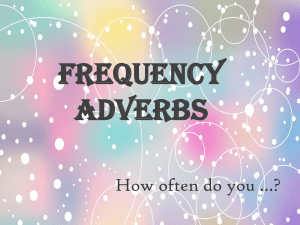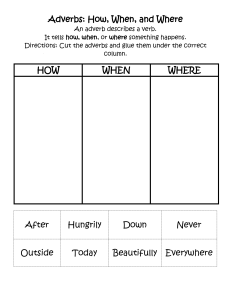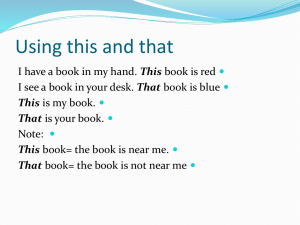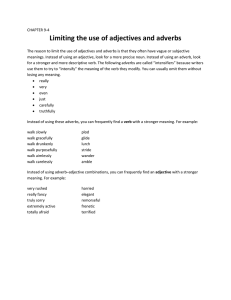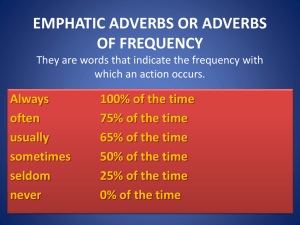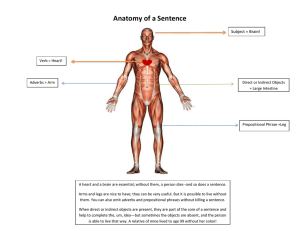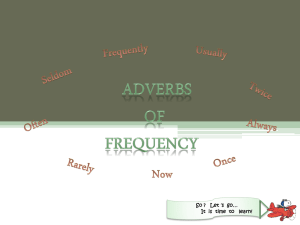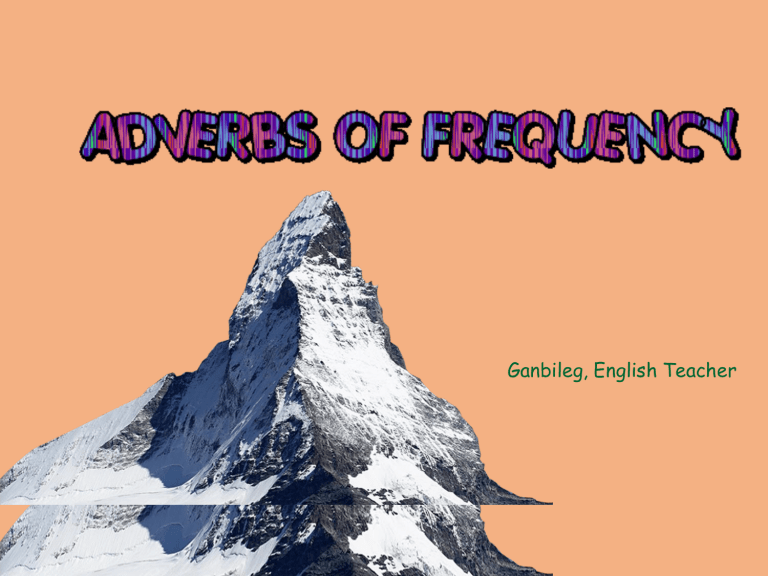
Ganbileg, English Teacher 100 % Always 80% Usually 60% Often 40- 50% Sometimes 20% Hardly ever 0% Never Use Use adverbs of frequency to answer the question How often…? Use a positive (+) verb with “hardly ever” and “never” 4 Position Adverbs of frequency go BEFORE all verbs (except be) SUBJECT + ADV. OF FREQUENCY + VERB EXAMPLES: She always plays tennis in the morning. They usually have lunch at work. 5 Position Adverbs of frequency go AFTER the verb to be (is – are – am) SUBJECT + VERB TO BE + ADVERB OF FREQUENCY EXAMPLES: She is always late for work. They are often hungry. 6 I READ A BOOK EVERYDAY. I ALWAYS READ A BOOK. I STUDY FRENCH FIVE TIMES A WEEK. SHE USUALLY RIDES A BIKE. SHE RIDES A BIKE TWICE A WEEK. SHE OFTEN RIDES A BIKE. I PLAY BASKETBALL ONCE A WEEK I SOMETIMES PLAY BASKETBALL I RARELY GO TO THE BEACH I DON´T GO FOR HORROR MOVIES. I NEVER WATCH HORROR MOVIES 0 % ALWAYS DO NOT FORGET !!! USUALLY OFTEN SOMETIMES RARELY NEVER 100 % ONCE 1 2 3 4 5 TWICE 1 2 3 4 5 THREE TIMES 1 2 3 4 5 FOUR TIMES 1 2 3 4 5 FIVE TIMES 1 2 3 4 5 19 what do you do in your free time? And how often? EXTRA INFO FOR UPPER LEVEL STUDENTS: What’s an adverb? •Adverb: •a word used for describing a verb (an action) – e.g., he walks slowly, •an adjective – e.g., it’s incredibly expensive, •another adverb, or a whole sentence – he works very hard.. •Adverbs in English often consist of an adjective with „-ly” added, for example „quickly”, „mainly,” and „cheerfully.” Adverbs of manner •Describe how somebody does something. •They usually go AFTER the verb or verb phrase, however, with passive verbs they usually go in mid-position (before the main verb but after an auxiliary verb). •He runs very fast. •The driver was seriously injured. Adverbs of frequency • Go before the main verb but after the verb to be. • I hardly ever have time for breakfast. (almost never) • Liam’s always late for work. • Karen realized that she was never going to learn to drive. • Sometimes, usually, and normally can also be put at the beginning of the phrase or sentence for emphasis. • If there are two auxiliary verbs, the adverb goes after the first one. • I would never have thought you were 40. Adverbs of time and place …. Adverbs of degree •Describe how much something is done, or modify an adjective. •Extremely, incredibly, very, etc., are used with adjectives and adverbs and go before them. • We’re incredibly tired. •A lot and much are often used with verbs and go after the verb or verb phrase. • My husband works a lot, but he doesn’t earn much. •A little/a little bit can be used before adjectives or after verbs, e.g., • I’m a little tired. • We rested a little bit after the flight. Comment adverbs •Which give the speaker’s opinion •Usually go at the beginning of a sentence or clause. •Unfortunately, the package never arrived. •Ideally, we should leave here at 10:00. •Other common comment adverbs are luckily, basically, clearly, obviously, apparently, eventually, etc. Other adverbs •Most other adverbs go in midposition, e.g., •I just need ten more minutes. •I almost forgot to go to class. •I’m nearly finished with my work. •She didn’t even say goodbye. •She’ll probably come in the end. Before the main verb. Adverbial Quiz! What kind of adverb is it? (Manner, frequency, time and place, degree or comment?) 1. 2. 3. 4. 5. 6. 7. 8. 9. 10. Immediately Unfortunately Incredibly Shouted angrily Normally Slightly Last month A lot Eventually Here 1. 2. 3. 4. 5. 6. 7. 8. 9. 10. Time Comment Degree Manner Frequency Degree Time Degree Comment Place Adverbial Quiz Correct the following sentences. 1. 2. 3. 4. 5. 6. 7. 1. She liked very much the present. 2. Mark came last night very late home. 3. A young man was injured badly and was taken to the hospital. She’s lazy a little bit about doing 4. her homework. I forgot your birthday almost, but 5. fortunately my sister reminded me. We luckily had taken an umbrella 6. because it started to rain just after we left. Jack has been apparently fired. 7. She liked the present very much . Mark came home very late last night. A young man was badly injured and was taken to the hospital. She’s a little bit lazy about doing her homework. I almost forgot your birthday, but fortunately my sister reminded me. Luckily we had taken an umbrella because it started to rain just after we left. Apparently Jack has been fired. Confusing adverbs and adverbial phrases HARD ~ HARDLY? • He works very hard – he’s very persistent. • It’s incredibly dark. I can hardly see anything. What’s the difference? What is the meaning of these adverbs? HARD: very much, needing a lot of effort HARDLY: almost NOT LATE ~ LATELY? I don’t like when my mother arrives late for the dinner. I haven’t seen Larissa lately. She must work a lot. What’s the difference? • LATE: not being on time. • LATELY: these days, nowadays, recently. At the end ~ in the end? • At the end of the class we always get the homework. • It took me two years, but in the end I passed my driving test. What’s the difference? At the end: when something has finished, e.g., at the end of the class / movie etc. In the end: eventually, after a period of time or series of events or difficulties. ESPECIALLY ~ SPECIALLY? • I love all kinds of sport, but especially Thai-Chi. • My graduation dress was specially made for me by a dressmaker. What’s the difference? ESPECIALLY: above all (principalmente) SPECIALLY: in a particular way or a particular purpose, only used with a parti ciple, e.g., It’s a specially designed umbrella. (exclusivamente) ACTUALLY ~ RIGHT NOW? • He looks older than me, but actually he is two years younger. • Right now we’re sharing an apartment, but hoping to move soon. ACTUALLY: IN FACT RIGHT NOW: now NEARLY ~ NEAR? • I’ve nearly done my homework. I’m on the last page. • Sorry madam, do you know if there is a bank near here? What’s the difference? NEARLY: almost NEAR: close STILL~YET? • He hasn’t found a job yet. • He still hasn’t found a job. What’s the difference? YET: goes at the end of a phrase STILL: in the mid position EVER ~ EVEN? Have you ever been to the US? I’ve been all over the US– I’ve even been to Alaska. What’s the difference? • EVER: at any time in the past, present or future • EVEN: used for showing that you are saying something that is SURPRISING. Resources • Macmillan English Dictionary • Longman Dicionárió Escolar • American English File 4A
